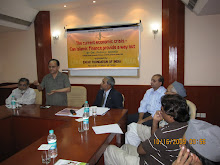Published in the Florida Times Union. Jun 27, 2007
Federal authorities called the alleged terrorist plot to blow up JFK Airport in New York "chilling." They said that if the terrorists were able to carry out their plot, they could have caused "unthinkable" damage to life and property, possibly crippling the U.S. economy.Missing from the announcement was any assessment of the likelihood of such a plot actually coming to fruition. New York Mayor Bloomberg said, "You have a much greater danger of being hit by lightning than being struck by a terrorist." He added, "Get a life!"
Former National Security Advisor Zbigniew Brzezinski recently asserted that the "war on terror" is causing us infinitely more harm than anything that the fanatical perpetrators of the 9-11 attacks could have ever imagined.A culture of fear has turned America away from being a confident nation to one that is susceptible to panic attacks. As a result, from foreign policy to domestic law enforcement, we see more hype than reason, and more paranoia than realistic concerns.President Franklin Roosevelt once said, "The only thing we have to fear is fear itself." Today, our fears are not so much the consequence of realistic threat assessments but rather politically-motivated fear mongering.
The day after the announcement of the JFK plot, I met with John Mueller, who holds the Woody Hayes Chair of National Security Studies at Ohio State University. He recently wrote a book called "Overblown: How Politicians and the Terrorism Industry Inflate National Security Threats, and Why We Believe Them." He spoke about how the JFK plot had all the markings of a "fantasy" and how once again the whole thing appears to be overblown.
President Bush and his supporters keep scaring us by saying that if we do not fight the terrorists in Baghdad they will be attacking us in Boise. If true, what does that say about the billions of dollars we have poured into boosting security measures since 9-11?
Is this a tacit admission that our government cannot protect us despite having assumed constitutionally-questionable powers such as eavesdropping on our conversations, building a wall on our southern frontier, listing over 400,000 names on a terrorist watch list, or making visitors wait months to get their visas for entry as time-consuming security checks are completed?
Terrorists cannot destroy America. They can occasionally produce deadly attacks, but we are too powerful and too resourceful a nation for terrorists to pose an existential threat.The chances of dying in a terrorist attack are 1 in 80,000. According to one study, only the odds of dying from earthquake, flood or firework discharge are lower. We are more likely to die from heart disease or for not wearing a seat belt than from a terrorist attack.
Military analyst William Arkin wrote in the Washington Post: "I think it is intellectually shallow to compare terrorists. . .with our enemies during the Cold War or the Second World War, who could have indeed destroyed our societies. . . .Every time we pretend we are fighting for our survival we not only confer greater power and importance to terrorists than they deserve but we also at the same time act as their main recruiting agent by suggesting that they have the slightest potential for success."
Terrorists and fear mongers will persist, just as they have throughout human history.
I share John Mueller's pessimism that, despite the low odds of terrorists succeeding, "Politicians will be inclined to sanctimoniously to play to those fears…bureaucrats will stoke the same fears. . .The entrepreneurs of the Current Danger industry. . .will first work very hard to sustain and milk the one currently within their grasp. . .And the press…will continue to make sure that what bleeds leads."
The power to change this situation is in the hands of those who choose not to remain silent, despite the unpopularity of drawing attention to the truths articulated by an academic, a former security official, and a mayor, among many others.
We can no longer afford to let agenda-driven hype replace sober re-assessments of international and domestic policies.
Blog Archive
-
►
2014
(1)
- ► April 2014 (1)
-
►
2010
(13)
- ► December 2010 (2)
- ► April 2010 (11)
-
►
2009
(6)
- ► October 2009 (2)
- ► April 2009 (2)
-
►
2008
(9)
- ► September 2008 (3)
- ► April 2008 (1)
-
▼
2007
(7)
- ► April 2007 (1)
- ► March 2007 (1)
-
►
2006
(1)
- ► October 2006 (1)

















No comments:
Post a Comment